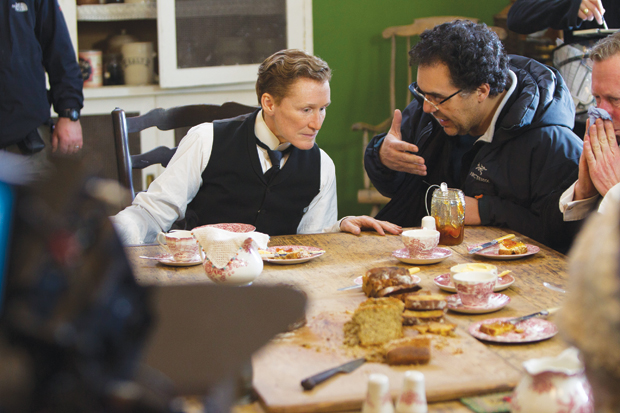 Rodrigo Garcia has made a career telling stories from a female perspective, a style he turns on its head in ‘Albert Nobbs’
Rodrigo Garcia has made a career telling stories from a female perspective, a style he turns on its head in ‘Albert Nobbs’

THE BUTLER DID IT Rodrigo Garcia, above right, directs Glenn Close, left in the gender-bending drama ‘Albert Nobbs.’
It’s not even 7 a.m. in California, but Rodrigo Garcia has already been awake for hours. He’s been in production on a series he’s shooting for the web about female characters.
It is nothing new for Garcia to be telling stories about women, although the format — webisodes — may seem a bit out of place for someone best know for writing and directing feature films and premium cable series. But it doesn’t bother Garcia — he lets his interests lead his career, not vice versa.
“What’s still driving my interest is the content — issues of identity, family dynamics … those kinds of things,” he says. “The studios are making less of those now, and more tentpole and high concept movies for young people. So why not the Internet? The platforms are still being explored. The draw is where can you tell stories that interest you.”
And the stories that have interested Garcia have often been those related to women, and frequently gay characters, as in his new film Albert Nobbs.
This is not unique in Hollywood, although it does put him in some rarefied company.
“There is a long line of male directors interested in female characters, from Bergman to Truffaut and Antonioni, all of whom had female characters at the center. Also Cukor and Minnelli in Hollywood. It’s not uncommon for guys to just go there.”
Garcia’s career arc has been rangy but compelling. He received an Emmy nomination for directing the pilot of Big Love, the HBO series about modern-day polygamists — another topic rife with women’s issues. He helmed several episodes of Six Feet Under, which famously had several gay characters, and was even invited by his friend Ilene Chaiken to direct The L Word, though he was never able to schedule it. (“I liked that show, obviously I felt comfortable with the subject matter,” he says.) His feature Nine Lives told interconnected stories of women, many about gay life.
But it started for Garcia with his first film, Things You Can Tell Just By Looking at Her, a portmanteau of shorts about women. It wasn’t his initial intent, though, to tell only women’s stories.
“When I was writing that movie, I wrote the women first. They were so complex, I just kept going. Ultimately, I don’t feel the movies are about women or female problems but things that interest me. But the subject matter could be male also, like the ties that bind us.”
Garcia walks the razor’s edge between male and female with his latest film, Albert Nobbs, which begins a staggered release this week (it opens in Dallas in late January). In it, Glenn Close plays Albert, a servant in an Irish hotel who for 30 years has been a gentleman’s gentleman.
Only Albert was born a woman, and has chosen to live her life as a trans man in an era where there simply was no definition of that. When Albert meets another woman living on the down-low, and begins to explore his feelings for a young chambermaid, his life is turned upside-down. The set-up means Garcia addresses issues of male-female identity with rare depth.
“The themes and conflicts were very strong. Albert is beyond from being ‘inside a closet’ — she has erased herself and supplanted it with her butler, now in her 50s.
I’ve started to recognize [the theme in my work] where you can’t live with someone and you can’t live without them. In the movie, the young girl that was Albert — I don’t even know what the young girl was called — and [the adult] Albert is that relationship.”
It was a reunion of sorts with Close, who worked with Garcia on both Things You Can Tell and Nine Lives. Close also produced and co-wrote the screenplay to Albert Nobbs.
As unusual as the plot may seem, Garcia says there are “many, many instances” of women hiding out as men to make their livings, working as butlers, or even as coal miners. Making the audience believe this could happen, though, is another matter.
“It’s happened many times where you’re in a public place and you see someone and you think, ‘Is that a man or a woman?’ But you would never consider asking them, ‘Are you something else?’ As long as you believe those around her couldn’t see it, you believe it. It’s extremely hard to pull off, but it didn’t worry me with Glenn.”
Garcia insists Close wore very little makeup to achieve the effect. “You don’t want the audience to feel like they didn’t even try so the nose is sort of a masculine version of the nose that sits on Glenn’s face and the ears are a little bigger — that’s it,” he says.
“The movie is about closets and what you have to repress to fit in, but it was not about a gay character because she’s not gay or straight — she’s erased that, too. It’s so sad she has to hide who she is.”
This article appeared in the Dallas Voice print edition December 23, 2011.















